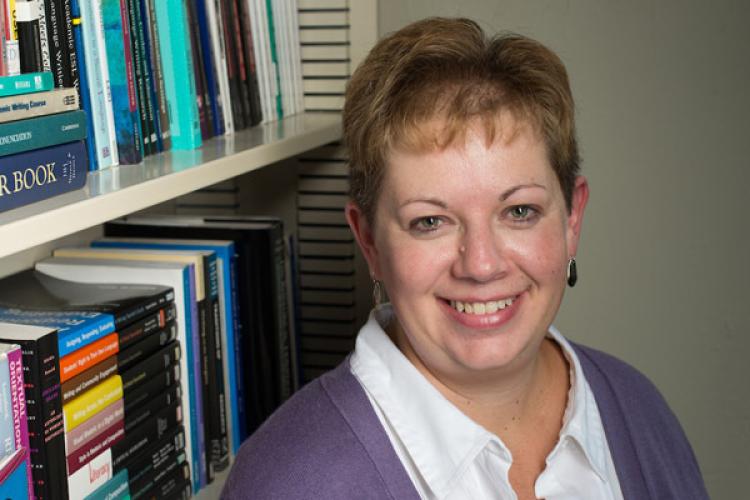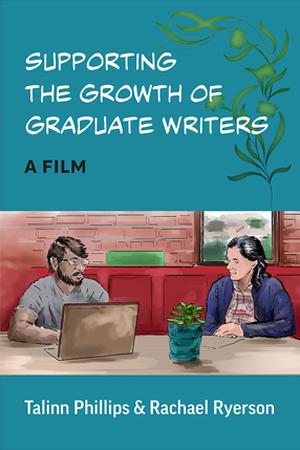
Talinn Phillips selected for State Department project, releases film project with alumna

Talinn Phillips of Ohio University was selected by the U.S. Department of State for a one-month English Language Specialist project focusing on writing retreats for faculty and graduate students in Russia at Higher School of Economics (HSE) in Moscow.
Phillips, associate professor of English in the College of Arts and Sciences at OHIO, is part of a select group, as her project is one of approximately 240 that the English Language Specialist Program supports each year.
This project is an extension of work Phillips completed last spring to support faculty and graduate students with publishing in English-language journals. With Dr. Ron Martinez of Academic English Specialists, she taught three workshops and an eight-week class to faculty at HSE. The course culminated in a discussion and strategy session about how to continue their writing momentum after the class. Now Phillips has been invited to return to support the Academic Writing Center at HSE as they offer a faculty writing retreat. After teaching three workshops to the English-language teachers who will lead small writing support groups, Phillips will then teach faculty during the writing retreat and provide one-on-one writing support sessions. The retreat format will draw on models she developed with funding from an Ohio University 1804 grant for the former Graduate Writing and Research Center.
Phillips co-chairs international association
Phillips currently co-chairs an international association called the Consortium on Graduate Communication, for which she also co-edits a new series that includes a book on Practice, Pedagogy, and Programming for Graduate Communication, "which seeks to identify pressing issues in writing and communication at the graduate level as well as how those issues impact practice, pedagogy, implementation, and institutional program building," Phillips said.
"This series addresses two ongoing challenges. First, scholars in a variety of fields have begun to attend more carefully to the needs and experiences that graduate students have in writing and communicating for their academic disciplines and professional communities," Phillips said. "At the same time, there are few published pedagogical frameworks, textbooks, or program models based in empirical research that provide guidance on how to implement effective practices or adapt existing models to different institutional contexts."
Phillips releases film project with alumna
Another project by Phillips supporting faculty and graduate students as writers is a film project with Ohio University alumna Rachael Ryerson just released by the University of Michigan Press, Supporting the Growth of Graduate Writers. Ryerson earned a Ph.D. in English and a Graduate Certificate in Women's, Gender and Sexuality Studies from the College of Arts and Sciences in 2017 and is now an assistant professor of English at Eastern Illinois University.

The film project is a series of short scenes that capture the work of OHIO graduate writers and writing consultants.
"Each scene has been collaboratively written to represent common issues graduate student writers face. Each scene also includes specific strategies writing consultants can use to help graduate students grow as writers. We anticipated that most writing programs would use individual scenes to train writing consultants on a particular issue," Phillips said. Everyone in the film was an OHIO student or faculty member when the film was made.
The filmmakers were Matt Love, a cinematographer in the Scripps College of Communication, and Carrie Love, who also worked in Scripps when the film was made in 2020. Both earned an MFA in Film from the College of Fine Arts in 2018. The narrator, Casanova Green, is a current doctoral student in English.
"Working with Matt and Carrie and with these writers and consultants was such a joy. We were really under pressure this time because we’d originally planned to film in April of 2020. After weeks of limbo and quarantine, we had to work very quickly to pull everything together before many of the actors graduated. We also had to figure out how to negotiate COVID. What you don’t see here is a plexiglass shield hanging between the writer and consultant to keep everyone safe because Matt and Carrie are absolute wizards and edited it out!" Phillips said.
This was not Phillips' first film project, as she and colleagues produced Becoming an Ally: Tutoring Multilingual Writers in 2017.
"The incredible thing about these projects is being able to work with the writers and draw on their experiences. They’re acting, but they’re also using their own early writing projects and drawing on their personal experiences as much as they feel comfortable. Scripting is a collaborative process where Rachael and I negotiate our goals for the scene—what’s the grad writing problem that we want to teach people about—with the particular experiences these writers have had and how much of that are they willing to share versus how much they’re willing to act," Phillips said.
"Then we develop a script that draws on their experiences to discuss the issue. We’re trying to walk a fine line between the things they’re willing to share and how able they feel to act out a common graduate student experience. And we never know what the answer will be until we’ve actually filmed the scene! What appears in the scene is never what exactly what happened to the writer, but it’s never completely fictionalized either. Then afterwards we have to decide how to frame that scene with narration based on what actually happened," she added.
Although Phillips specializes in rhetoric and composition, she enjoyed using film as a genre to teaching students how to write.
"The other thing I’ve loved about these projects is challenging myself to compose beyond print, which is what I’m most used to. We have to decide how to develop an appealing setting, what kind of music to use in the soundtrack, and which take is most effective. We also had to figure out how to use the visual space that’s happening during the opening scene narration where we frame each scene. Is the screen too crowded? Is there too much dead space or are the pauses too long?" Phillips said.
"I had to learn how to edit in different ways as well. We work through the scene drafts over and over, looking for moments to cut so that we can tighten the focus and identifying other moments that we want to highlight. Developing these scenes has also meant working in new genres for us and I have to ask myself questions like, 'How does narration work, exactly? What on earth do we need to say here?' It gives me great empathy for my students when I’m asking them to move into an unfamiliar genre," she said.
The film project by Phillips and Ryerson has been released on an open-access site so that others can benefit from the experience of these writers and consultants.
About the English Language Specialist Program
The English Language Specialist Program is the premier opportunity for leaders in the field of teaching English to speakers of other languages (TESOL) to enact meaningful and sustainable changes in the way that English is taught abroad. Through projects developed by U.S. Embassies in more than 80 countries, English Language Specialists work directly with local teacher trainers, educational leaders, and ministry of education officials to exchange knowledge, build capacity, and establish partnerships benefiting participants, institutions, and communities in the United States and overseas.
Since 1991, the English Language Specialist Program has supported in-country, virtual, and mixed projects in which hundreds of TESOL scholars and educators promote English language learning, enhance English teaching capacity, and foster mutual understanding between the U.S. and other countries through cultural exchange. During their projects, English language specialists may conduct intensive teacher training, advise ministries of education or participate in high-level educational consultations, and offer plenary presentations at regional, national or international TESOL conferences. These projects are challenging and those selected represent the best of the U.S. TESOL community. In return, the program provides professional development opportunities to help participants experience different cultures and build skills that can greatly enhance their TESOL careers at home.
English Language Specialists are counted among the more than 50,000 individuals participating in U.S. Department of State exchange programs each year. The program is administered by the Center for Intercultural Education and Development at Georgetown University.
